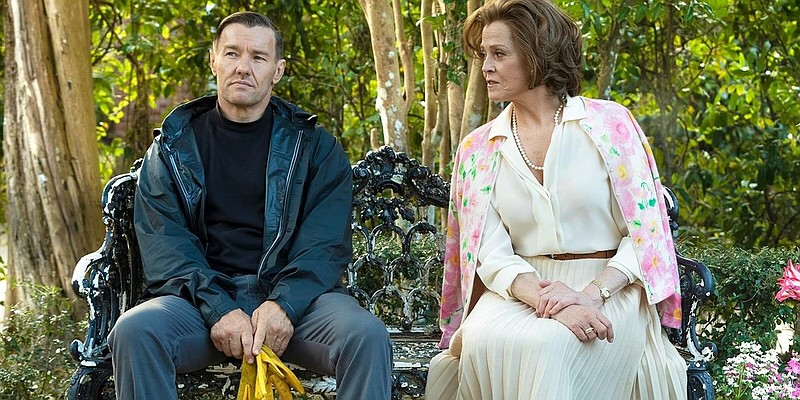Director Paul Schrader has some big, well-known titles in his film credits, from writing the screenplay for "Taxi Driver" to directing 2021's well-received "The Card Counter." His newest film is "Master Gardener," and it's all too eager to plant some interesting ideas in the first half that never quite grow to their full potential come harvest time.
I'm not much for gardening. It seems my fingers were meant more to be placed on a keyboard or around a book than in the soil. While some people connect deeply with the Earth as Joel Edgerton's character does in this movie, I connect more through wordcraft, whether speaking to people and hearing their stories or penning my own meager thoughts Philip Martin mercifully allows to be printed here.
"Master Gardener" begins with a fascinating history of western gardening. Edgerton plays a dedicated horticulturist named Narvel Roth. He oversees a garden owned by a wealthy, older woman named Norma Haverhill (Sigourney Weaver). On the surface, their relationship is cordial and stiff.
And while Norma would certainly call Narvel a friend, it's apparent that he is nothing more than her employee. And it's the same for her maid, chef, and other workers who run the garden. They certainly all seem content with that.
Edgerton spends chunks of "Master Gardener" buried in his own thoughts on flowers and recollections of his feelings in the day-to-day events. But he's not penning a novel. Instead, we, the viewer, are treated to his subconscious through meticulous journaling, another device of perspective I enjoyed.
I couldn't tell you why, but I enjoy narration in movies where it has a purpose and isn't thrown in haphazardly, whether that's here or in the thoughts of Deckard in "Blade Runner."
Narvel is a rigid and fascinating character. His dedication to the garden, to the roots, and even the soil underneath is the most interesting part of the movie. I know nothing about horticulture. But Edgerton was such a talented teacher that I found myself captivated. I wouldn't have complained one bit if the movie was just two hours of him running a garden, teaching apprentices, and dealing with the inner turmoil of his past, which I'll come back to.
Norma soon introduces Narvel to her great-niece, Maya (Quintessa Swindell), and asks him to make her an apprentice. She's had a rough go of it in life, and her great-aunt apparently wants to offer her a second chance.
Maya is quick to learn and proves to be an interesting matchup for the man with rules so rigid they could withstand a nine-point earthquake. And yet her very presence soon causes Narvel to start questioning his focus, his personal code, and even how he feels about anything other than flowers.
It doesn't take long for Norma to reveal some less-than-admirable character traits in the way she talks to Maya. This seems to be attributed to her worsening health and mental decline, which the movie doesn't hesitate to put on full display. And Weaver plays that role just fine.
For reasons not quite made apparent to me, the script decided Maya and Narvel need to be romantically entwined, despite having little reason to be. And when Norma gets wind of this, she's quick to kick both of them out of the garden.
That's where I felt the film lost what made it interesting. The garden was a compelling setting, and it's where the primary conflict with Norma existed. Once Narvel and Maya leave, the film is reduced to some overly familiar crime aspects, vague settings as the pair bounce from bland motel to motel, and aimless character developments that reveal two things.
First, Narvel's messy past shows he never really did penance for his mistakes. And given the horrific things we see him do, the film needed to give viewers a good reason for his character's transformation. But all we're given is a line or two about how he's a different person now. It cheapens the development.
Second, Maya isn't given much to do in "Master Gardener" other than be a victim, whether it's to drugs or an abusive dealer (who may be a boyfriend). When she discovers Narvel's past, she's rightfully furious, and then they reconcile without much reason. If they'd stayed in the garden for the entire movie, I feel Maya would have benefited much more as a character with more room to grow and interesting things to do. But I attribute this character's faults to writing and certainly not Swindell's performance.
I enjoyed the first half of "Master Gardener," and Edgerton's performance was a part of that. When he's talking about plants, I'm fully invested. I just wish he could have remained in an interesting setting and wrestled with his demons there, perhaps with an appropriate character transition to explain how past Narvel became present Narvel. The latter half of this movie seems content with leaving most of the planted ideas buried in the soil.
Maybe I just wanted a nature documentary on plants narrated by Edgerton as Narvel. And perhaps my wishes for what this film could've been rather than what we got just aren't the movie Schrader wanted to make. Either way, "Master Gardener" fell off halfway through, and I'm disappointed.
"Master Gardener" is available On Demand.

